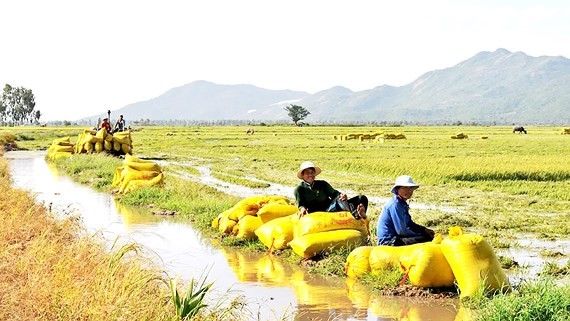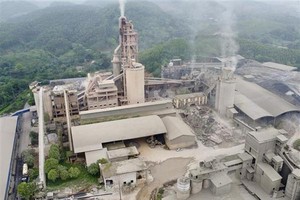
The Mekong Delta is facing climate change with extreme impact of natural disasters causing difficulties for agricultural production, especially smallholder farmers are extremely vulnerable to agricultural risks and climate change.
Therefore, the Ministry of Agriculture and Rural Development and locals authorities in Mekong delta provinces have beefed up switching of production models focusing on encouraging farmers to join in large-scale cooperatives.
A representative from the Ministry has said that lately tens of cooperatives in provinces such as Soc Trang, Bac Lieu, Kien Giang, Ca Mau guided farmers to switch growing rice to growing rice with breeding shrimp to adapt to climate change and the new style proves effective. Application of smart farming in ten thousands of paddy fields and using organic fertilizers have helped cooperatives in An Giang, Dong Thap, Long An, Tien Giang reduce production cost and improve produce quality.
Moreover, many cooperatives namely Tan Thuan Tay Mango cooperative in Dong Thap province, Binh Hoa Phuoc rambutan cooperative in Vinh Long province have actively linked with enterprises to revamp agriculture value chains.
Besides, more and more cooperatives including Tam Vu dragon cooperative in Long An Province, Tan Cuong Cooperative in Dong Thap, Go Cong cooperative in Tien Giang Province have generated VND10 billion ($429,087) in annual turnover.
A leader of Can Tho Department of Agriculture and Rural Development said that realizing the importance of agriculture cooperatives in coping with climate change, the Department has reinforced the cooperatives’ activities and raised management capacity as well as increased information of linkage between cooperatives and enterprises.
Farmers’ awareness of cooperatives has been gradually lifted and more agricultural cooperatives have helped farmers apply technologies in production and offered more employment to local laborers.
Head of the Agriculture Ministry's Economic Co-operation and Rural Development Department Le Duc Thinh said that more and more farmers are willing to become members of cooperatives and highly appraise the role of agricultural cooperatives.
From 2016, the Mekong delta is one of three regions with high number of newly established cooperatives countrywide; by the end of 2018, the region has had 1,803 agricultural cooperatives making up 13 percent of the country’s total cooperatives.
The Institute of Policy and Strategy for Agriculture and Rural Development said that sustainable agricultural cooperatives have gradually set up in the region adapting to climate change but they are small scale without stable market; accordingly, they need more support from the government and relevant agencies to multiply.
Worse, application of seed technology in seedlings is limited affecting climate change adaptability of cropping and farming systems; plus, due to lack of information of climate change development, local governing bodies are confused in building strategies g and policies for agricultural development.
Deputy Prime Minister Vuong Dinh Hue said that the Ministry of Agriculture and Rural Development has been assigned to build an overall program for sustainable agricultural development in the Mekong delta adapting to climate change connecting with agricultural re-structuring and the government’ new rural plan.
He added that effective pilot projects will be beefed up and completed for the expanse of new-style cooperatives in the region in the period 2016 – 2020 as well as implementation of solutions to improve cooperatives’ effectiveness to be adaptable with market mechanism in the context of global integration and climate change.
The government has also verified agricultural cooperative adaptable for climate change that will help raising manufacturing efficiency and lessen risks for farmers.
Accordingly, Deputy PM Hue asked the Ministry of Agriculture and Rural Development and relevant agencies to add supporting policies for processing produce of cooperatives as well as provide training to cooperative managers.
Furthermore, the ministry should create favorable condition for cooperatives to take part in socioeconomic development program and the government’s new rural plan while taking heed of popularizing the role and significance of agricultural cooperatives, Mr. Hue said.
























